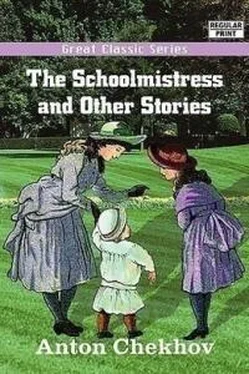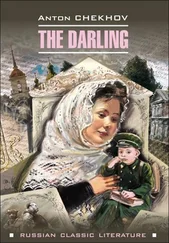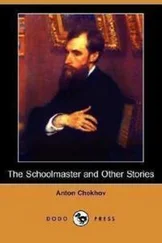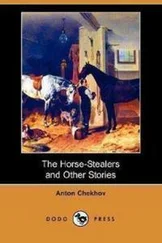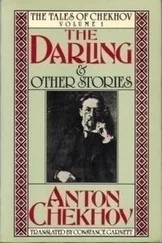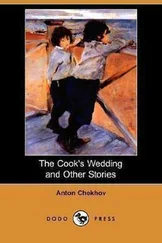I suddenly realized that I was utterly alone on the whole vast plain; that the night, which by now seemed inhospitable, was peeping into my face and dogging my footsteps; all the sounds, the cries of the birds, the whisperings of the trees, seemed sinister, and existing simply to alarm my imagination. I dashed on like a madman, and without realizing what I was doing I ran, trying to run faster and faster. And at once I heard something to which I had paid no attention before: that is, the plaintive whining of the telegraph wires.
"This is beyond everything," I said, trying to shame myself. "It's cowardice! it's silly!"
But cowardice was stronger than common sense. I only slackened my pace when I reached the green light, where I saw a dark signal–box, and near it on the embankment the figure of a man, probably the signalman.
"Did you see it?" I asked breathlessly.
"See whom? What?"
"Why, a truck ran by."
"I saw it,…" the peasant said reluctantly. "It broke away from the goods train. There is an incline at the ninetieth mile…; the train is dragged uphill. The coupling on the last truck gave way, so it broke off and ran back…. There is no catching it now!…"
The strange phenomenon was explained and its fantastic character vanished. My panic was over and I was able to go on my way.
My third fright came upon me as I was going home from stand shooting in early spring. It was in the dusk of evening. The forest road was covered with pools from a recent shower of rain, and the earth squelched under one's feet. The crimson glow of sunset flooded the whole forest, coloring the white stems of the birches and the young leaves. I was exhausted and could hardly move.
Four or five miles from home, walking along the forest road, I suddenly met a big black dog of the water spaniel breed. As he ran by, the dog looked intently at me, straight in my face, and ran on.
"A nice dog!" I thought. "Whose is it?"
I looked round. The dog was standing ten paces off with his eyes fixed on me. For a minute we scanned each other in silence, then the dog, probably flattered by my attention, came slowly up to me and wagged his tail.
I walked on, the dog following me.
"Whose dog can it be?" I kept asking myself. "Where does he come from?"
I knew all the country gentry for twenty or thirty miles round, and knew all their dogs. Not one of them had a spaniel like that. How did he come to be in the depths of the forest, on a track used for nothing but carting timber? He could hardly have dropped behind someone passing through, for there was nowhere for the gentry to drive to along that road.
I sat down on a stump to rest, and began scrutinizing my companion. He, too, sat down, raised his head, and fastened upon me an intent stare. He gazed at me without blinking. I don't know whether it was the influence of the stillness, the shadows and sounds of the forest, or perhaps a result of exhaustion, but I suddenly felt uneasy under the steady gaze of his ordinary doggy eyes. I thought of Faust and his bulldog, and of the fact that nervous people sometimes when exhausted have hallucinations. That was enough to make me get up hurriedly and hurriedly walk on. The dog followed me.
"Go away!" I shouted.
The dog probably liked my voice, for he gave a gleeful jump and ran about in front of me.
"Go away!" I shouted again.
The dog looked round, stared at me intently, and wagged his tail good–humoredly. Evidently my threatening tone amused him. I ought to have patted him, but I could not get Faust's dog out of my head, and the feeling of panic grew more and more acute…Darkness was coming on, which completed my confusion, and every time the dog ran up to me and hit me with his tail, like a coward I shut my eyes. The same thing happened as with the light in the belfry and the truck on the railway: I could not stand it and rushed away.
At home I found a visitor, an old friend, who, after greeting me, began to complain that as he was driving to me he had lost his way in the forest, and a splendid valuable dog of his had dropped behind.
IT WAS a dark autumn night. The old banker was walking up and down his study and remembering how, fifteen years before, he had given a party one autumn evening. There had been many clever men there, and there had been interesting conversations. Among other things they had talked of capital punishment. The majority of the guests, among whom were many journalists and intellectual men, disapproved of the death penalty. They considered that form of punishment out of date, immoral, and unsuitable for Christian States. In the opinion of some of them the death penalty ought to be replaced everywhere by imprisonment for life.
"I don't agree with you," said their host the banker. "I have not tried either the death penalty or imprisonment for life, but if one may judge a priori , the death penalty is more moral and more humane than imprisonment for life. Capital punishment kills a man at once, but lifelong imprisonment kills him slowly. Which executioner is the more humane, he who kills you in a few minutes or he who drags the life out of you in the course of many years?"
"Both are equally immoral," observed one of the guests, "for they both have the same object—to take away life. The State is not God. It has not the right to take away what it cannot restore when it wants to."
Among the guests was a young lawyer, a young man of five–and–twenty. When he was asked his opinion, he said:
"The death sentence and the life sentence are equally immoral, but if I had to choose between the death penalty and imprisonment for life, I would certainly choose the second. To live anyhow is better than not at all."
A lively discussion arose. The banker, who was younger and more nervous in those days, was suddenly carried away by excitement; he struck the table with his fist and shouted at the young man:
"It's not true! I'll bet you two millions you wouldn't stay in solitary confinement for five years."
"If you mean that in earnest," said the young man, "I'll take the bet, but I would stay not five but fifteen years."
"Fifteen? Done!" cried the banker. "Gentlemen, I stake two millions!"
"Agreed! You stake your millions and I stake my freedom!" said the young man.
And this wild, senseless bet was carried out! The banker, spoilt and frivolous, with millions beyond his reckoning, was delighted at the bet. At supper he made fun of the young man, and said:
"Think better of it, young man, while there is still time. To me two millions are a trifle, but you are losing three or four of the best years of your life. I say three or four, because you won't stay longer. Don't forget either, you unhappy man, that voluntary confinement is a great deal harder to bear than compulsory. The thought that you have the right to step out in liberty at any moment will poison your whole existence in prison. I am sorry for you."
And now the banker, walking to and fro, remembered all this, and asked himself: "What was the object of that bet? What is the good of that man's losing fifteen years of his life and my throwing away two millions? Can it prove that the death penalty is better or worse than imprisonment for life? No, no. It was all nonsensical and meaningless. On my part it was the caprice of a pampered man, and on his part simple greed for money…."
Then he remembered what followed that evening. It was decided that the young man should spend the years of his captivity under the strictest supervision in one of the lodges in the banker's garden. It was agreed that for fifteen years he should not be free to cross the threshold of the lodge, to see human beings, to hear the human voice, or to receive letters and newspapers. He was allowed to have a musical instrument and books, and was allowed to write letters, to drink wine, and to smoke. By the terms of the agreement, the only relations he could have with the outer world were by a little window made purposely for that object. He might have anything he wanted—books, music, wine, and so on—in any quantity he desired by writing an order, but could only receive them through the window. The agreement provided for every detail and every trifle that would make his imprisonment strictly solitary, and bound the young man to stay there exactly fifteen years, beginning from twelve o'clock of November 14, 1870, and ending at twelve o'clock of November 14, 1885. The slightest attempt on his part to break the conditions, if only two minutes before the end, released the banker from the obligation to pay him two millions.
Читать дальше
